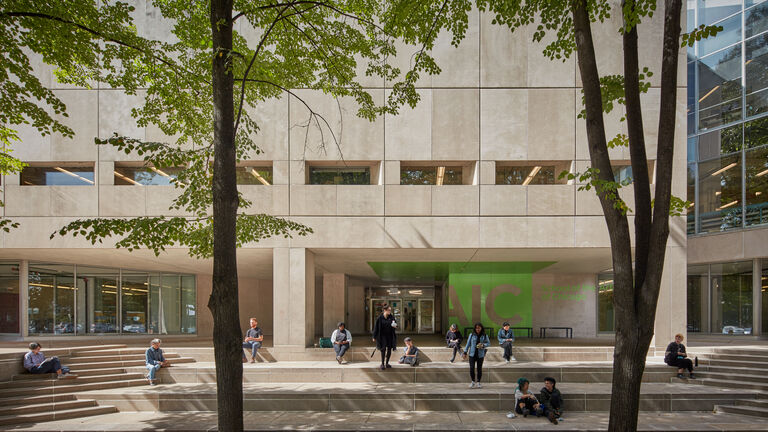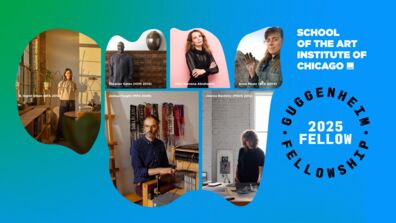
School of the Art Institute of Chicago Receives Climate Grant from the Helen Frankenthaler Foundation
CHICAGO (August 27, 2024)—The School of the Art Institute of Chicago (SAIC), a global leader in art and design education, has been awarded a $50,000 climate grant from the Helen Frankenthaler Foundation. The School will use the funds to commission a study to evaluate the feasibility of implementing renewable clean heating and cooling technology in two historic campus buildings on Michigan Avenue. SAIC has long been committed to sustainability through a variety of efforts, including energy conservation and waste diversion. Improving the energy efficiency of campus buildings plays a critical part in reducing greenhouse gas emissions.
“We currently use carbon by way of natural gas to heat our buildings,” said SAIC Vice President for Campus Operations Tom Buechele. “The grant will help us see if it’s possible to update our system to use geothermal heating and cooling. Geothermal technology is much better for the environment; it would lower our carbon footprint and ultimately be less expensive for us to operate.”
Geothermal technology is known as the most cost-effective and environmentally friendly HVAC and water-heating system available. Such systems are proven to reduce energy costs by up to 50 percent and produce zero direct emissions that contribute to air pollution and climate change. However, the technology has never before been implemented in buildings in downtown Chicago.
“Installing a geothermal system requires drilling down to the geothermal energy source,” Buechele said. “Drilling in a park or other open space—as Chicago has done elsewhere in the city—is easy. But it hasn’t been done in such a densely developed area like the Loop where we don’t have the option of drilling in an open space. Instead, we would be drilling below 100+-year-old buildings. So, we’re eager to know if it’s possible, and environmental experts will obviously be interested in the results of our study as well, to see if this can work elsewhere.”
The study will focus on the feasibility of implementing geothermal heating/cooling technology in two SAIC-owned buildings: the Lakeview Building at 116 S. Michigan and the MacLean Building at 112 S. Michigan. (The adjacent buildings are connected by a 14th floor walkway.) Located directly across from the Art Institute of Chicago museum, the buildings are a central hub for the SAIC community, which serves more than 3,500 students each year. Over the years, both buildings have undergone numerous expansions, and each now rises to an impressive height of approximately 17 stories, collectively encompassing a vast 327,000 square feet. Depending on study results, the cost savings and environmental benefits of installing a geothermal heating/cooling system in the buildings could be substantial. It would also be a model first-of-its-kind project for the city of Chicago.
The SAIC climate grant is part of the Helen Frankenthaler Foundation’s gift of $3.3 million to 69 visual arts organizations across the US to help them make energy-efficient upgrades, from adding solar panels and changing the lighting in their buildings to auditing their overall energy use and creating plans for achieving carbon neutrality.
About the School of the Art Institute of Chicago
For more than 155 years, the School of the Art Institute of Chicago (SAIC) has been a leader in educating the world’s most influential artists, designers and scholars. Located in downtown Chicago, with a fine arts graduate program ranked number two in the nation by U.S. News and World Report, SAIC provides an interdisciplinary approach to art and design as well as world-class resources, including the Art Institute of Chicago museum, on-campus galleries and state-of-the-art facilities. SAIC’s undergraduate, graduate and post-baccalaureate students have the freedom to take risks and create the bold ideas that transform Chicago and the world, and adults, teens and kids in our Continuing Studies classes have the opportunity to explore their creative sides, build portfolios and advance their skills. Notable alumni and faculty include Georgia O’Keeffe, Nick Cave, David Sedaris, Cynthia Rowley, Michelle Grabner, Richard Hunt, Apichatpong Weerasethakul and Jeff Koons.
